A visit to the APMC in Vashi revealed that calcium carbide, which is known to cause cancer, food poisoning, nausea etc — is being used to ripen the fruit faster, so as to increase sales
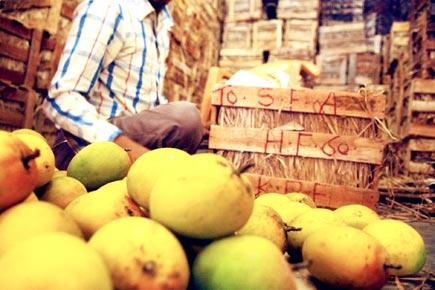
Mango
Think before you sink your teeth into those juicy, delicious mangoes. For, they could have been ripened artificially using calcium carbide, a deadly chemical that is known to be carcinogenic.
ADVERTISEMENT
Also read: CaC2 may cause cancer, blindness, seizures
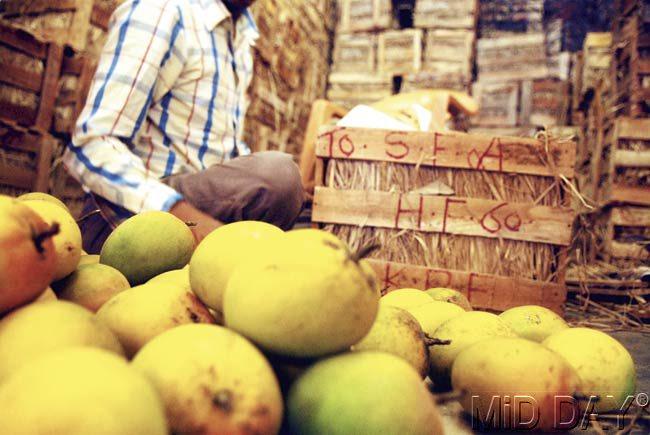
Many calcium carbide pouches are tucked away in each crate of mangoes. The fumes are enough to ripen the mangoes, even if they don’t touch the fruit. The moment the colour of the mangoes turns yellow, the pouches are removed. Pic/Pradeep Dhivar
While the Food Safety and Standards (FSS) Act, 2006, says that calcium carbide is banned, use of the compound by traders to ripen the fruit is rampant at the APMC, Vashi fruit market.
Also read: Chemical trail - How the mango is ripened artificially

The entire act is done in the open, and law-enforcing agencies (FDA) turn a blind eye to it. In its foray into the market, mid-day learnt that the chemical is available within every 200 metres inside the fruit market.
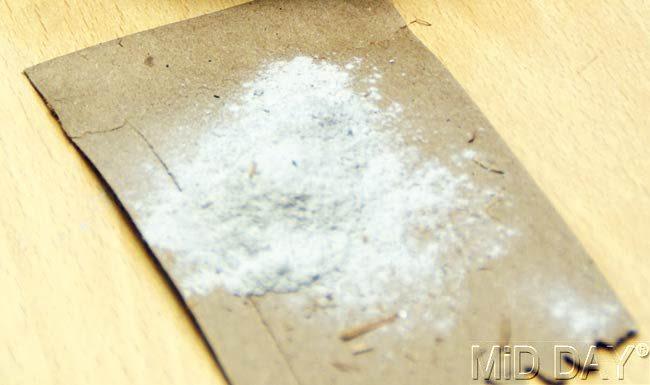
Popularly known as ‘carpet’, it is available for as cheap as Rs 100 a kg, which is sufficient to ripen over 100 dozen of raw mangoes. In blatant disregard for child labour laws, minors are exposed to this hazardous chemical.
Along with some casual labourers, they get a paltry sum of Rs 6 for packing a dozen raw mangoes with calcium carbide, or Rs 20 for a box, irrespective of the number of mangoes inside it.
Buying the chemical
Calcium carbide or ‘carpet’, as it is referred to in APMC fruit market, is easily available at every corner stationery outlet inside the market.
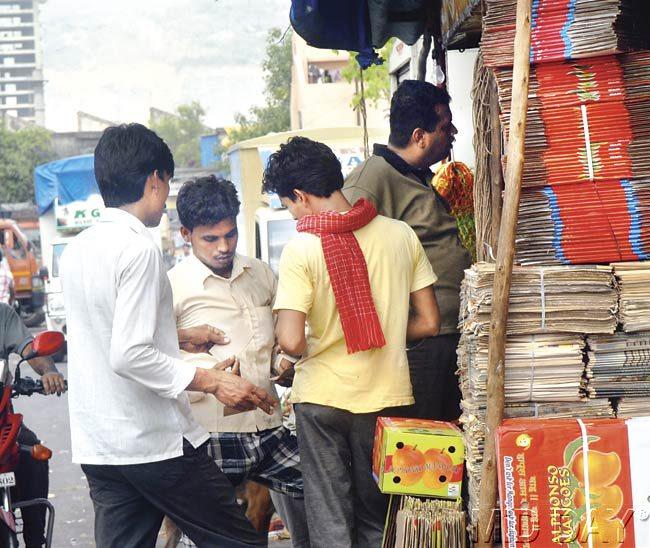
Also known as ‘Carpet’, the chemical is sold in envelopes at almost every corner stationery store in the APMC market. Pics/Pradeep Dhivar
While its sale is restricted to strangers and unknown faces, insiders can get their hands on it whenever they wish to. This reporter had to visit almost three outlets before he could succeed in convincing a retailer to sell the chemical to him. The attendant at the shop initially denied having the chemical, and when showed the residue of greyish-white powder lying on the floor of his shop, he admitted to having it and handed over a packet filled with calcium carbide.
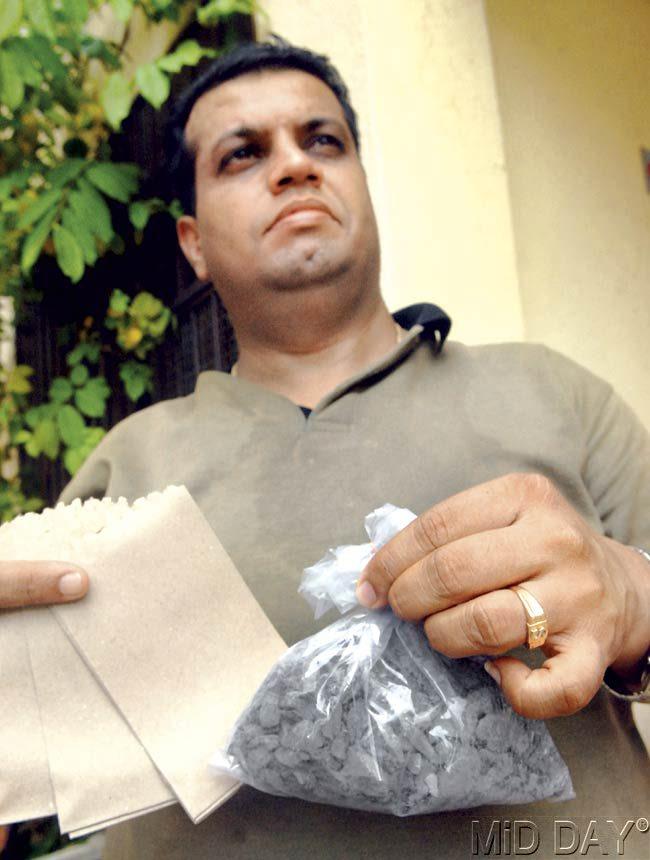
mid-day successfully bought around half a kilo of the chemical
On weighing, it was found to be less than 450 grams, for which we were charged Rs 50, with a few brown envelopes thrown in free of cost.
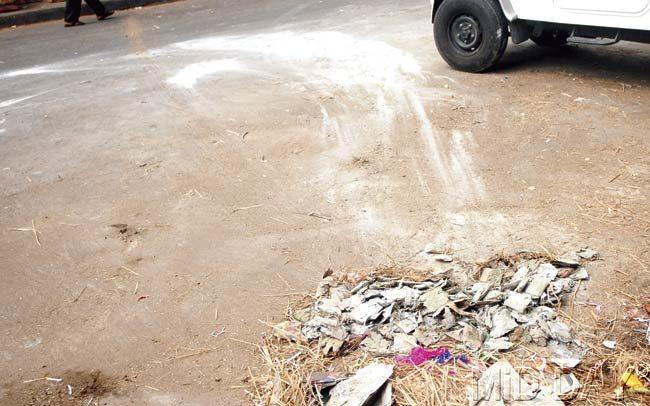 Calcium carbide (the white powder) is spilled on the market floor, with envelopes containing it strewn about everywhere
Calcium carbide (the white powder) is spilled on the market floor, with envelopes containing it strewn about everywhere
The entire market has the chemical’s stain. On the ground one can spot a pile of used pouches at various places. Sweepers were cleaning up the garbage there.
How they are ripened
Nutpur Rehman (44), a retail trader at the fruit market, hails from Jharkhand and has been in the business of selling mangoes for over 15 years at the APMC market, where he stays from January to June (mango season).
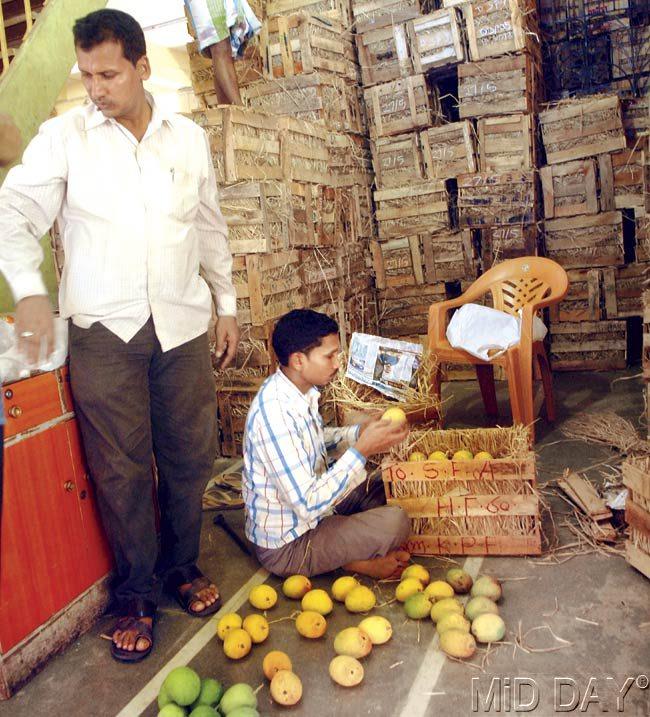
Nutpur Rehman (standing) pays R1 lakh for operating a mango stall for six months at the market
He rents a gala of 225 sq feet approximately, paying Rs 1 lakh rent for the period. He sells, on an average, 50 to 100 boxes of mangoes daily and claims to make a profit of Rs 50 behind every box after taking care of his overhead expenses, including packing, handling, storing, electricity, labour, food etc.
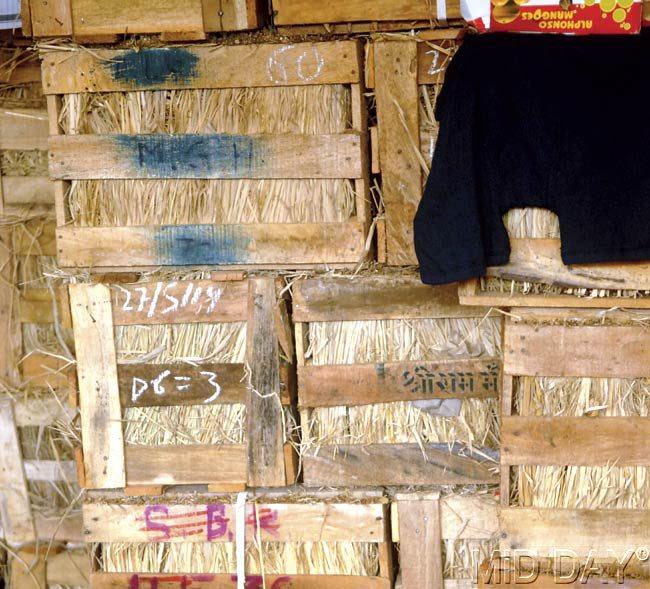 Once the outer layer of mangoes turns yellow, the calcium carbide envelopes are removed
Once the outer layer of mangoes turns yellow, the calcium carbide envelopes are removed
Like Rehman, many retail traders have rented premises inside the fruit market and have stocked boxes of raw mangoes. All of them use calcium carbide for ripening the raw mangoes.
Anees Shaikh, a labourer at the site, explained to this reporter that the number of envelopes may increase, depending on the quantity of mangoes in the boxes — which is usually 3, 4 or 5 dozen.
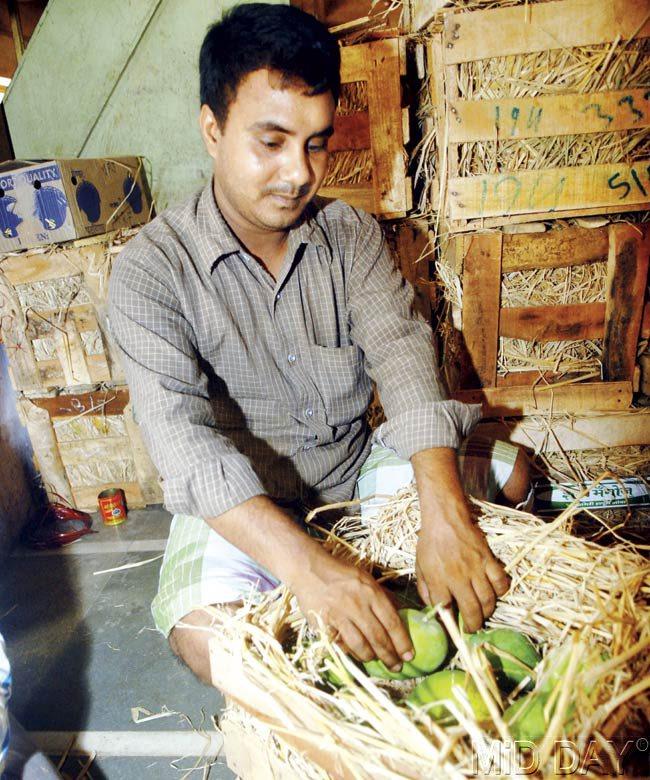 The chemical is put inside small paper envelopes and retailers keep one or two packets at the bottom and side of the raw mango boxes. The space in between is covered with hay
The chemical is put inside small paper envelopes and retailers keep one or two packets at the bottom and side of the raw mango boxes. The space in between is covered with hay
The chemical reaction begins and generates heat, its fumes helping ripen the fruit. The trader ensures that the envelope is not kept for more than 12 to 36 hours – they have to keep monitoring the chemical reactions on the mangoes.
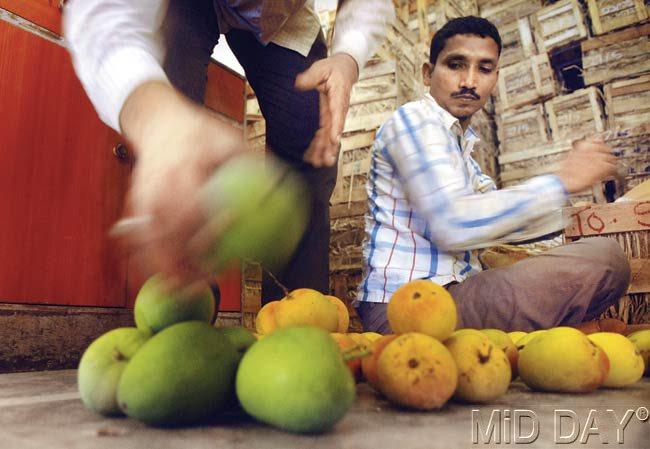
The moment the colour of the outer layer of mangoes turns yellow, the envelope is removed. The chemical inside has changed from crystal solid to greyish white powder.
When asked the reason for using such a method to ripen the mangoes, Rehman confessed, “The natural process of ripening take nearly 7 to 12 days. It is just impossible to even think of running a business with such high overheads. With ‘carpet’, the entire process is faster and quicker.”
When asked about the health hazards to his labourers and customers, he said, “We are in this business for over a decade and till now everyone is healthy. Even we eat the same fruit.”
Minors being exposed
Feroze Shaikh (17) hails from Ranchi in Jharkand, and has been working at the fruit market for the last eight years, between January to June every year.
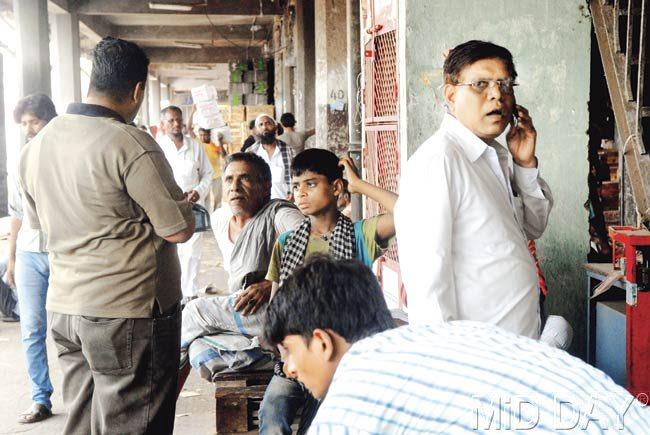
13-year-old Mohammad Sabir Shaikh has dropped out from school to ripen mangoes with ‘carpet’ at the APMC market in Vashi
He has studied till Std IX this year, he has even gotten his younger brother Mohammed Sabir Shaikh (13), who is a school dropout. Soon after the season is over, they will return to their hometown and come back after monsoon, to sell fish in Mumbai markets, a job that his father Mohammed Irfan has been doing for decades in Mumbai.
Feroze and his brother Sabir both take up packing assignments even outside the market, but their rates are fixed — Rs 6 per dozen of mangoes or Rs 20 for per box. On an average, Feroze is able to pack 40 to 50 boxes of mangoes with carpet in less than two hours, and on an average they earn anywhere between Rs 600 to Rs 1,000 every day.
They manage to save approximately Rs 60,000 to Rs 70,000 by the end of the term, after taking care of their expenses. Their daily expenses including Rs 15 for using the common toilet and bathroom with soap, Rs 25 for tea in a day, Rs 50 to Rs 75 for meals etc.
An elderly man known as ‘Chachaji’, who has been at the market for nearly two decades, and with whom Sabir was spotted, said, “He is an all-rounder; he knows all the work and is being trained.” When asked if the chemical didn’t burn their palm, the elderly man said, “We are so used to it that we get no sensation of heat any more.”
The raw deal
Umesh Lanjekar (50), a Ratnagiri-based farmer who has been cultivating mangoes for decades, has minutely studied usage of calcium carbide by traders at APMC.
Lanjekar elucidated that APMC traders emphasised on taking raw mangoes from farmers – these are then chemically ripened and sold to retailers. The strategy behind this is that when raw, the fruit doesn’t show many faults.
On ripening, it develops black spots and other anomalies, which renders it unprofitable, and these cannot be sold in the market. Farmers are paid only for the good product and not for the fruit with blemishes. Thus, with raw mangoes being chemically ripened, APMC traders are able to garner profit.
Farmers, too, cannot be let off the hook completely. When the mango season begins, farmers race to send as many mangoes as they can to earn profits. In this race, a lot of raw green mangoes are also dispatched, which are then ripened with the use of calcium carbide.
In this way, the market gets saturated within a few weeks of the season, after which the prices start falling. Farmers go into losses in the long term, in exchange for short-term profits at the beginning of the season. Lanjekar further added, “Another factor responsible for green mangoes in the market is that farmers employ unskilled labour from other regions in order to cut labour costs.
These labouerers, naturally, cannot differentiate between raw and ripe mangoes very easily, as it is a very tedious job to pluck mangoes while balancing oneself on the tree, or to recognise a ripe mango from a raw one from a huge distance under the scorching sun, while plucking the fruit from the ground by using special tools.
 Subscribe today by clicking the link and stay updated with the latest news!" Click here!
Subscribe today by clicking the link and stay updated with the latest news!" Click here!






